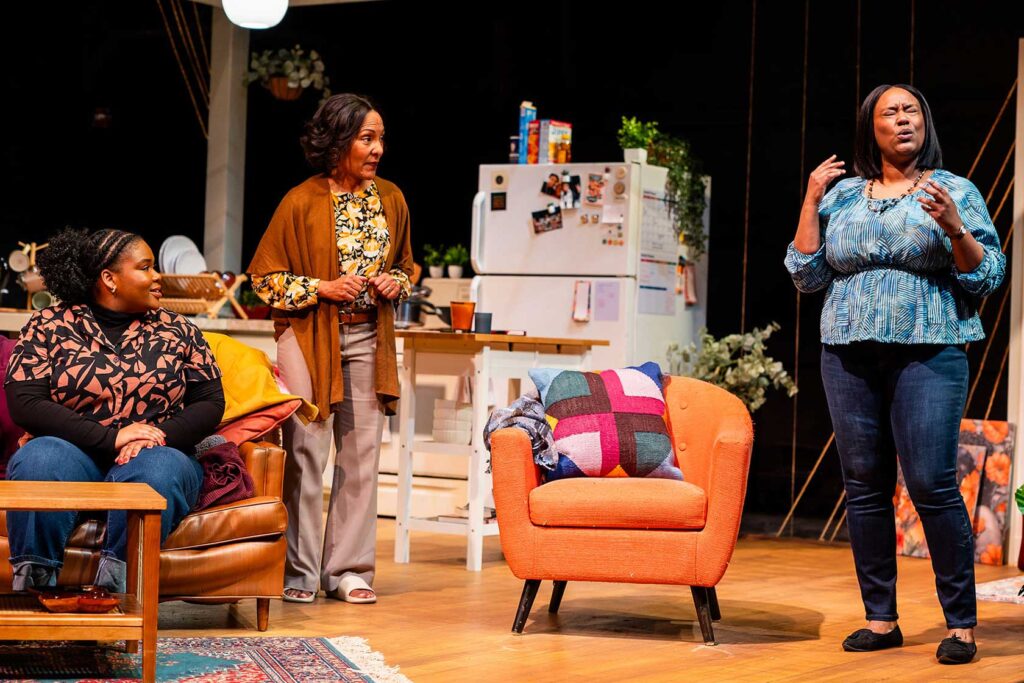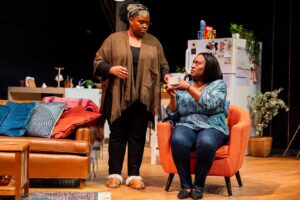Fourth play in Mfoniso Udofia’s ‘Ufot Family Cycle’ at Central Square Theater

“Why let me go?” is a question no daughter should have to ask her mother. But young Nigerian Iniabasi Ekpeyong has arrived in the USA, where she was born, to reunite with her mother, Abasiama Ufot. After giving birth to Iniabasi 30 years ago, Abasiama let her then-husband return to Nigeria with their newborn.
Mother and daughter meet in the New York City apartment of Adiaha, the oldest of the three children Abasiama has raised with her second husband, Disciple, also a Nigerian immigrant. Abasiama replies, “I wanted to stay. To complete the things your father and I were supposed to complete. … I could not do that with you by my side. So I let you go.”
The three women begin to recreate their family in the absorbing production of Nigerian-American playwright Mfoniso Udofia’s play “Her Portmanteau,” on stage through April 20 at Central Square Theater in Cambridge. Co-produced by Central Square Theater and Front Porch Arts Collective and directed by Tasia A. Jones, the production runs about an hour and a half without intermission.

Lorraine Victoria Kanyike and Jade A. Guerra play sisters Adiaha and Iniabasi. PHOTO: MAGGIE HALL PHOTOGRAPHY
“Her Portmanteau” is the fourth play in Udofia’s nine-play “Ufot Family Cycle,” which follows three generations of a Nigerian American family. Udofia was raised in a Nigerian American community in Southbridge and attended Wellesley College; a group of Greater Boston theater companies is presenting her cycle in its entirety for the first time. The two-year series began in November with the world premiere of “Sojourners” followed by “The Grove,” both produced by the Huntington Theatre Company; in late April the Huntington will release the third play, “runboyrun,” as a podcast. The cycle concludes in summer 2026 with the ninth play, a folk opera.
The reunion is not going according to plan. Instead of arriving in Boston where Abasiama was to bring her to the Ufot family home, Iniabasi (Jade A. Guerra) awaits her mother at JFK Airport.
Against the rumble of airport noise, Iniabasi uses a pay phone to call her young son Kufre, who is in Nigeria. Speaking in English and Ibibio, she assures him of her safe arrival.
Iniabasi expects her mother, but instead her half-sister Adiaha Ufot (Lorraine Victoria Kanyike) arrives to welcome her. They met decades ago when Adiaha visited Nigeria as an eight-year-old. Knowing that her father, crazed by childhood memories of the Nigerian civil war, regards Iniabasi as an interloper, Adiaha rerouted Iniabasi’s ticket from Logan to JFK and she will host Iniabasi in her New York City apartment.
Guerra and Kanyike are naturals in their respective roles, each conveying the dry humor and poetry of Udofia’s language and their characters’ halting gains in mutual respect and trust.
Staging by director Tasia A. Jones and her creative team, including scenic designer Shelley Barish and lighting designer Eduardo M. Ramirez, has the eloquence and economy of the play itself. They transform the stage of the 180-seat theater into Adiaha’s apartment, a well-furnished living area with a many-cushioned sofa, a kitchenette and counter with stools for dining. A door opens into an offstage bedroom.
The cast wears stylish casual attire by Chloe Moore. Sound effects by Arshan Gailus and Jo Williams evoke a busy airport. Julia Wonkka makes deft use of props, from a vintage pay phone to a red suitcase that bears photographs of a family severed by war and conflicting ambitions.
Adiaha ushers Iniabasi into her presentable 5th-floor walkup—too presentable to the assessing eyes of Iniabasi, who says, “Cockroaches would be scared to step inside this place.”
Although Adiaha persists with small gestures of courtesy and welcome, Iniabasi is having little of it. She proceeds to inspect the apartment, taking a visual inventory to satisfy her hunger for familial facts and truths. Iniabasi’s eyes fix on the portraits that adorn the walls. They show Abasiama and Disciple and Adiaha’s younger siblings, Toyoima and Ekong.
With increasing agitation, Adiaha shuffles sofa cushions and chatters about making fufu with Jiffy instead of palm oil. Observing Iniabasi’s stress, she invites her to break things — her own way to release tension. Pointing to a vase, she says, “It’s IKEA so, like 99 cents? Whatever. Break it.” Instead, the two go out for a walk.
Abasiama arrives frantic with regret for being late after driving from Worcester to JFK in a rented car. As Abasiama, Patrice Jean-Baptiste initially overplays her character’s angst but later, as Abasiama asserts her will to reunite her family, her character’s ascent in power rings true.
Left alone after her daughters go out, Abasiama recognizes Iniabasi’s worn red suitcase as the one she carried from Nigeria. She opens it with a hunger for truth similar to her daughter’s and finds pictures of family members, including one of her yet unknown grandson, Kufre. She speaks with her daughters about their family’s Ibibio names: Abasiama (God’s love), Adiaha (first daughter), Iniabasi (God’s time), Kufre (never forget) and gains her footing as the matriarch who will bring her family together. She tells Iniabasi, “No more waiting.”






